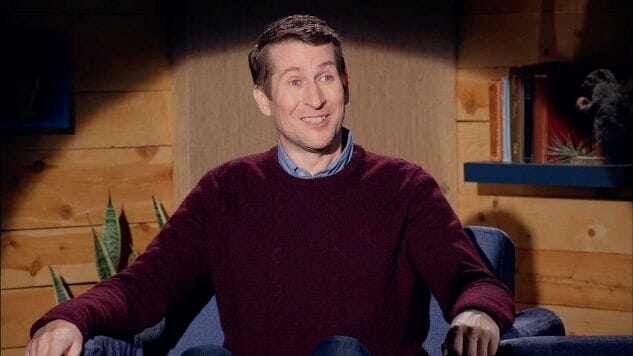Going Out With a Bang: Saying Goodbye To Comedy Bang! Bang!

I will never forget my first experience with Comedy Bang! Bang!
In 2010, I was having a rough time. I was working overnight at a job I hated and was just out of a years-long relationship. Nothing made me happy anymore. In an attempt to get out of my daily malaise, I looked through the iTunes Comedy podcasts and decided to download “The Best of 2010” episode of a podcast I had never heard of: Comedy Death Ray. At about two A.M. at the aforementioned job, I listened to host Scott Aukerman and guest Paul F. Tompkins present the best moments from the ending year. I was introduced to Nick Kroll’s Spanish-language DJ El Chupacabra, Tompkins’s over-the-top Andrew Lloyd Webber and Seth Morris’s chronically injured Bob Ducca. And I couldn’t quit laughing. I laughed until I cried and my stomach hurt at a time when I needed to be happy more than anything.
What Aukerman gave me and his audience with this and every episode was a consistent source of pure joy. In the world of Comedy Death-Ray—which would become Comedy Bang! Bang!—the weirdest characters could come from the most mundane origins, like a high school student from Marina Del Rey or a little orphan boy, and inspire comedic brilliance. A simple mispronunciation could turn “heynongman” into a catchphrase. The audience of Comedy Bang! Bang! could feel like a select group, one who found it hard to hear “my wife” or “it’s been a while” without laughing to themselves, aware of an inside joke that no one got. Aukerman introduced the world to a universe of comedians and characters, with its own comedic language full of references and odd diversions that could turn mistakes into convoluted canon and the simplest lines or cheesy jokes into transcendent experiences.
In that first episode I listened to, Aukerman described his podcast as “part talk show, part comedy program. We don’t talk about comedy. We try to do it.” What started as a live show at the Upright Citizens Brigade Theater in Hollywood would go on to become the podcast, which in 2012, became a TV show on IFC. On the podcast, the audience had to use their imagination for whatever crazy whims the host and his guests felt like exploring. But with Comedy Bang! Bang! the TV show, this insane universe became flesh and blood. It no longer resided in our earbuds and our imaginations—it was now on TV. By becoming a television show, it was almost as if the style of humor that the fans loved was being validated.
Going back to the first episode, “Zach Galifianakis Wears A Blue Jacket & Red Socks,” which premiered on June 8, 2012, the format of the podcast translated quite well into the new format. Galifianakis was an ideal guest, and characters from Thomas Lennon and Andy Daly brought familiar voices into the spotlight. Having performed the theme song for the podcast, Reggie Watts was the obvious choice for the show’s bandleader and Aukerman even has his guests play a game at the end of the episode, much like he often does on the podcast.
But from that very first episode, Comedy Bang! Bang! substantiates its existence on television, throwing out ideas that could’ve never been done in an audio-only format. At one point, Galifianakis tries to imagine a dog talking, which then turns Aukerman into a talking dog (Aukerman’s actual dog, Rocky). Games like “Tsk Tsk, Attaboy” would’ve never made sense without the visual element, nor would a random plot where Aukerman feeds his parking meter in a post-apocalyptic wasteland.
As a podcast, one of Comedy Bang! Bang!’s main strengths was its loose format and improvisation. Yet as a TV show, Bang! Bang! would use its structure as a gift, rather than a curse. In its 110 episodes, Bang! Bang! could reconfigure its show to parody everything from Pixar films to time-travel adventure. The podcast had no limits other than the lack of visuals, but even with the limits the TV show had, like budgets and time restraints, the show still was able to allow any idea to work incredibly well. This adventurous ability to make almost every episode a different style kept the show exciting and fresh, even if taking the easy way out would’ve still been hilarious. Did the show need to have an upside down episode, or tell an entire show in one shot? Probably not, but it created a unexpected quality that was always fascinating.
-

-

-

-

-

-

-

-

-

-

-

-

-

-

-

-

-

-

-

-

-

-

-

-

-

-

-

-

-

-

-

-

-

-

-

-

-

-

-

-








































